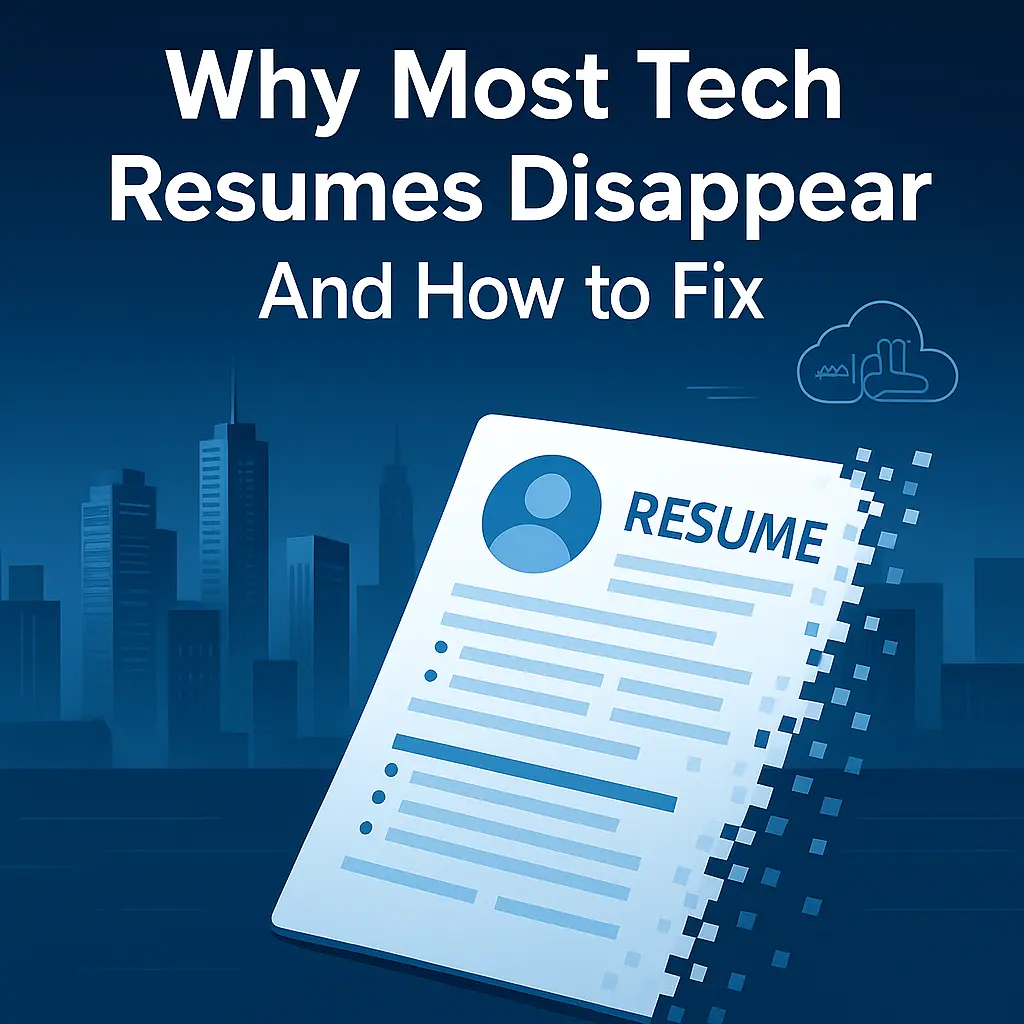Are you fresh out of college?
Maybe you’re applying for your first tech job because you're ready to move out, the student loans are piling up, or you're just excited to finally step into the real world.
Whatever the reason, you want to break into the tech scene, fast.
Mid-senior stage? We got you.
You’re no longer a beginner but not quite a lead yet. You’ve got experience under your belt, but now you’re aiming for a role with more responsibility, better pay, or a company that finally feels like a fit.
Then there are the senior professionals.
The architects, the engineering leads, and the tech executives. You’ve managed teams, scaled systems, and made high-impact decisions. But even with that kind of experience, if your resume doesn’t communicate strategy, leadership, and business outcomes, you could still be overlooked or passed over for promotions.
No matter where you are in your tech career, your resume needs to reflect the right level of experience, clarity, and alignment with your target role. What works for a fresh graduate won’t work for someone applying to a senior engineering position.
Recruiters can tell in seconds if your resume fits the level you claim to be at.
Let’s break it down by career stage so you can see what matters most at each level and how to make your resume work harder for you.
📌 You could be the perfect candidate, but your resume is ruining it. Why Most Tech Resumes Disappear And How to Fix That
How to Fix Your Tech Resume for Every Stage
Not all resumes are created equal, especially in tech, where intense competition is the norm and application filters can feel discouraging.
The same resume that got you your first job out of college won’t get you that mid-level developer role, and it certainly won’t land you a senior position or leadership track. Whether you're fresh out of school or a seasoned tech exec, your resume must reflect the depth, value, and clarity expected at each stage of your career.
If You’re a Fresh Graduate
Breaking into tech with no formal experience can feel overwhelming. It’s easy to get lost, but the key is to shift the spotlight onto what you do have.
- Focus on academic projects, capstone work, or hackathons that show hands-on skills.
- Add personal or passion projects, especially if you solved a real-world problem.
- Highlight transferable skills like problem-solving, critical thinking, and adaptability.
- Include GitHub portfolio or portfolio links so hiring teams can see your work in action.
- Don't shy away from soft skills, especially if you’ve led group work or participated in student organizations.
📌 Still jobless after graduation? Here’s what no one tells you about entry-level jobs. 5 Reasons New Graduates Are Struggling to Land Jobs
If You’re Entry-Level With 1–2 Years of Experience
At this stage, hiring managers want to see momentum. You don’t need years of experience. You need to show that you're learning fast, taking initiative, and building real value.
- Emphasize how your role evolved, even in a short time.
- Show results, not just responsibilities, even if it’s "reduced ticket resolution time by 20%."
- Demonstrate growth across tools or workflows, like learning new frameworks or automating tasks.
- Mention any mentorships, side contributions, or cross-functional collaboration.
If You’re Mid-Level
Now is the time to highlight depth, ownership, and real business value. At this stage, hiring managers want more than just a list of skills. They want to see how you’ve made a difference.
- Prioritize outcomes. For example, “Improved system reliability by 40%” is much more impactful than simply saying “maintained infrastructure.”
- Showcase collaboration with cross-functional teams, such as product, UX, or DevOps.
- Explain the reasoning behind your technical decisions. Don’t just share what you did; also show why it mattered.
- Tailor your resume for each role, especially if you have relevant domain knowledge or industry-specific experience.
If You’re Senior-Level or in Leadership
At the senior level, your resume should focus on strategy, leadership, and measurable business outcomes. Technical execution still matters, but what sets you apart is your ability to influence, lead, and deliver results at scale.
- Show how your leadership created impact. For instance, “Led a team of 8 to reduce latency by 70%” tells a much stronger story than listing leadership as a soft skill.
- Highlight key architectural decisions, mentoring experience, and collaboration across departments.
- Connect your work to big-picture goals like revenue growth, system scalability, or user retention.
- Keep it clear and concise. Your resume should sound like someone who makes thoughtful, high-level decisions and not just someone who manages tasks.
Sounds like a lot of work?
It should be, but Jobsolv can make it easier for you.
Customizing your resume for every job might feel like a full-time job in itself, and honestly, it should take effort. Your resume is your first impression, your elevator pitch, and your ticket into the roles you actually want.
But you don’t have to do all of it alone.
Jobsolv is a free AI-powered resume builder built specifically for tech professionals. Whether you're a recent graduate, mid-level developer, or senior engineer, Jobsolv helps you tailor your resume to match your exact target role.
You can generate role-specific resumes in minutes using real-time AI resume tailoring, so you're not stuck copying and pasting bullet points or guessing which keywords matter.
It also keeps everything clean, ATS-friendly, and optimized to get past filters that reject most resumes before a recruiter sees them.
Here’s what you get for free with Jobsolv:
- AI Resume Tailoring that aligns your experience with the job you’re applying for
- A free resume builder with clean formatting and keyword optimization
- A built-in job tracker to keep all your applications in one organized place
- Tech-specific focus, especially for remote and hybrid roles across the U.S.
- An upcoming curated job board for high-paying tech jobs in the U.S., including remote and hybrid opportunities
So if you’re tired of getting ignored after applying, your resume disappearing, this is the tool that helps your resume stand out for the right reasons.
📌 Why waste hours tailoring resumes when this free tool can do it better and faster? The best resume customization tool, it’s free and has no signup hassle.
FAQs
Q: Should I list every tech tool I’ve used?
No. Prioritize tools and technologies relevant to the job. Use context to show how you applied them and not just a keyword dump.
Q: How can I make my resume stand out for remote tech jobs?
Highlight projects you've completed remotely or asynchronously.
Q: What is the best format for a tech resume in 2025?
A clean, reverse-chronological format works best. Focus on relevant skills, measurable results, and keyword-rich job descriptions that align with the role.
Q: Should I customize my resume for every tech job I apply to?
Yes. Tailoring your resume to each job description improves your chances of passing ATS scans and shows recruiters you’re serious about the role.
Q: What should junior tech candidates include if they lack work experience?
Highlight coursework, internships, academic projects, bootcamps, hackathons, or freelance work. Include a GitHub profile or portfolio to show real skills.
Q: How can I show leadership on a tech resume without a manager title?
Mention leading projects, mentoring juniors, owning initiatives, or cross-team collaborations. Leadership is about influence, not just a title.
Q: How do I prove my technical skills on a resume?
Include the tools you’ve used and how you used them. Instead of listing “Python,” say, “Built automation scripts in Python that reduced manual tasks by 30%.”
Q: How do I list outdated tools or legacy systems on a tech resume?
Only mention outdated tools if they’re relevant to the role. Otherwise, focus on modern equivalents to show you're staying current.
Q: What are common resume mistakes that hurt experienced engineers?
Too much jargon, lack of impact metrics, outdated formats, or vague bullet points. Senior resumes must show strategic thinking, leadership, and tangible outcomes.
Q: How do I know if my tech resume is actually working?
If you’re applying consistently and hearing nothing back, your resume may be the issue. Use free ATS checkers, ask a recruiter, or test with a resume builder tool like Jobsolv.
Final Thoughts: Your Resume Should Evolve With Your Career
Your tech resume should reflect where you are now and where you’re headed. Maybe you were taught something different in school, but that’s okay. We’re not here to gatekeep.
The truth is, no matter how experienced you are, your resume must grow with you. What worked when you graduated won’t cut it when you’re leading teams or pitching for senior roles. Recruiters and hiring managers can instantly tell whether a resume is built for the level you're aiming for.
If your resume isn’t customized, results-driven, or aligned with your career goals, it’s probably getting filtered out, either by a robot or a real person.
But this is fixable.
There’s no need to start from scratch. You can fix your tech resume. All you need is the right structure, clarity, and strategy. Whether you’re entering tech, pivoting, or aiming higher, now’s the time to make your resume work as hard as you do.
📌 Use Jobsolv, the best resume customization tool made specifically for tech professionals. Build a tailored, ATS-friendly, and role-specific resume today for free. Your next role is waiting.
.svg)


















